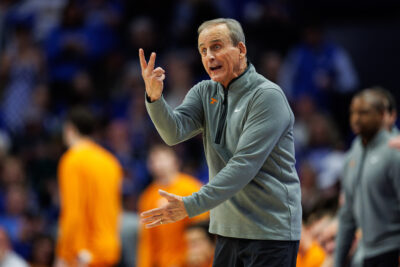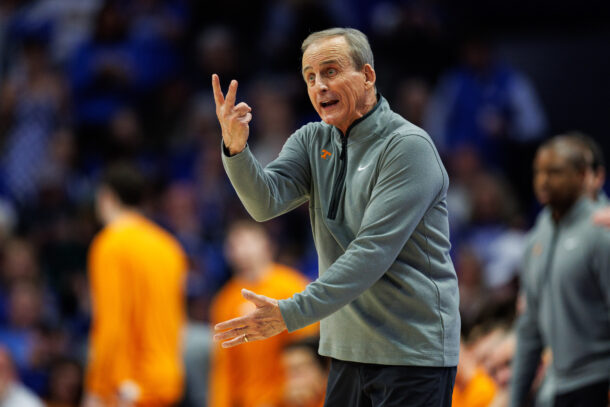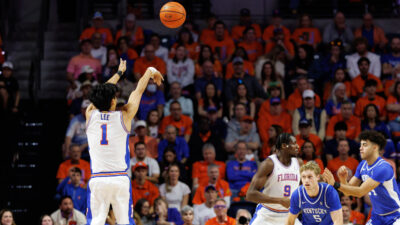Steve Ensminger was an LSU quarterback.
And a good one.
He led the Tigers from 1976-1979.
Now he’s their offensive coordinator, still leading the offense, only in a different way.
And he’s a good offensive coordinator.
But more than that, he’s a Tiger, a loyal Tiger.
He has been a key contributor – and an unsung one – in No. 1 LSU’s first run to the College Football Playoff, where it will face No. 4 Oklahoma in the Peach Bowl in the Mercedes-Benz Stadium on Saturday.
Ensminger played quarterback for Charles McClendon, who was Les Miles before Miles was.
McClendon, like Miles, was an extremely successful coach. McClendon, like Miles, emphasized a strong defense and a relatively conservative offense.
Ensminger was the last quarterback of record for McClendon, who won more games than any other coach in LSU history.
But McClendon kept his quarterbacks under wraps, as Miles did. Ensminger was “the passing quarterback.” He split time with the “running quarterback,” Pat Lyons in 1976, David Woodley for the next three seasons.
It’s ironic that the passing quarterback has taken the path Ensminger has taken to the CFP semifinals.
He was an offensive coordinator at McNeese State, Louisiana Tech, Texas A&M and Clemson, among other jobs, before returning to his alma mater as tight ends coach under Miles in 2010.
When Miles was fired 4 games into the 2016 season, defensive line coach/recruiting coordinator Ed Orgeron was named interim head coach. One of the first changes Orgeron made was to fire offensive coordinator Cam Cameron and promote Ensminger to offensive coordinator.
In the Tigers’ first game under Orgeron, and with Ensminger as offensive coordinator, LSU gained its most yards ever in an SEC game in a 42-7 victory against Missouri.
In 8 games under Ensminger, the Tigers averaged 32 points after averaging 21 under Cameron.
The resurgent offense helped LSU go 6-2 under Orgeron and eventually Orgeron was named full-time head coach after bigger names passed on the job.
Ensminger’s reward? He was demoted back to tight ends coach because Orgeron reluctantly felt the need to hire a “name coordinator,” so he grabbed Matt Canada from Pitt.
LSU needed Ensminger to go back to his old job because the head coach thought it was best for the Tigers. Ensminger understood. He accepted the change and went back work to help the Tigers.
The Orgeron-Canada pairing never worked. Canada was a good coach, but it turned out his style wasn’t what Orgeron wanted.
Why this wasn’t apparent before the hiring is hard to figure, but Orgeron recognized it quickly. After 1 season, he got rid of Canada and brought Ensminger back as coordinator.
Ensminger was content as a position coach. He was content as the coordinator. He’s a Tiger. He was content to do whatever the Tigers needed.
Last season, the Tigers were improved on offense. Ensminger’s pro-style scheme was much more in tune with what Orgeron wanted. But something was missing.
Orgeron wanted to revamp the passing game. He brought in a 29-year-old NFL assistant named Joe Brady to be his passing game coordinator and wide receivers coach, essentially carving out a large part of Ensminger’s turf and handing to the NFL equivalent of a graduate assistant.
The passing quarterback who used to come out of games when coach McClendon wanted to use the running quarterback package made room for Brady. They were both Tigers now. They were going to make Orgeron’s unconventional but sensible plan work.
A lot of coaches’ egos would not have allowed them to accept the changing roles and welcome Brady. Ensminger’s did. His love for LSU made it easy.
Orgeron called Ensminger “the general.” “He’s in charge,” the head coach said on multiple occasions.
Early in the season, Brady would make occasional play-call suggestions. Ensminger listened. He followed Brady’s suggestions. They worked. A lot.
Ensminger started turning to Brady more and more for suggestions. They kept working. Periodically, Ensminger let Brady drive.
The Tigers ran an offense neither McClendon nor Miles would recognize. It was probably a bit foreign to Ensminger.
But the general and his young lieutenant put together he most prolific offense in LSU history, averaging 47.8 points per game. Joe Burrow had the most prolific passing season in SEC history.
The Tigers went undefeated, won their first SEC title in eight years. They’re the favorites to win the national championship.
Shortly after LSU beat Georgia in the SEC title game, Burrow went to New York to pick up the Heisman Trophy. Brady went to Little Rock, Arkansas to pick up the Broyles Award, the Heisman for assistant coaches.
Ensminger went to work – getting the Tigers ready to face Oklahoma.
Les East is a New Orleans-based football writer who covers LSU for SaturdayDownSouth.com. Follow him on Twitter @Les_East.







